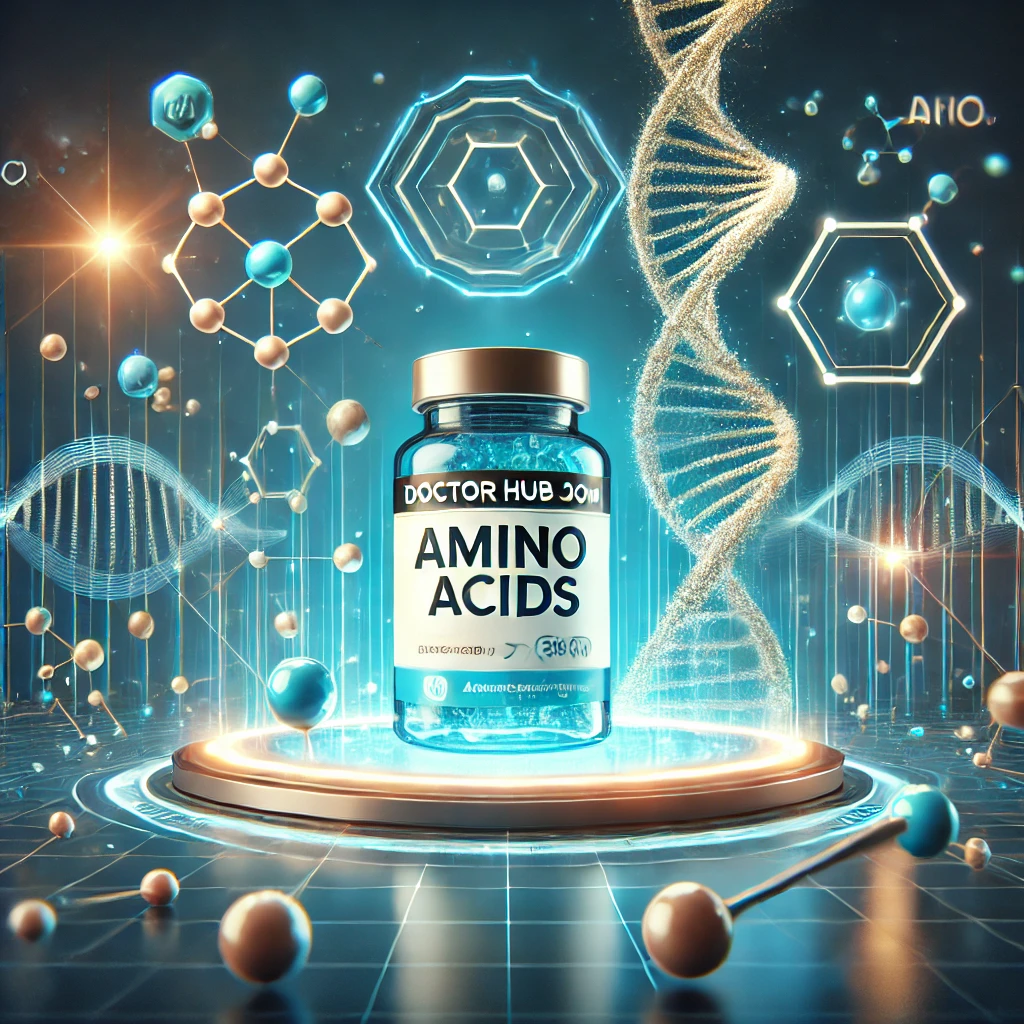Doctorhub360.com amino acids Did you know that amino acids are often called the “building blocks of life”? These tiny molecules play a massive role in your body, helping to build proteins, support metabolism, and enhance overall health. Whether you’re an athlete looking for muscle recovery, someone focused on mental clarity, or simply aiming for a healthier lifestyle, understanding amino acids can unlock countless benefits.
In this guide, we’ll break down everything you need to know about amino acids, their health benefits, the best dietary sources, and whether supplements are necessary. If you’re curious about optimizing your health with amino acids, this is the perfect place to start.
What Are Amino Acids & Why Do They Matter?
Amino acids are organic compounds that combine to form proteins, which are essential for nearly every function in your body. They help with tissue repair, immune system support, and even cognitive function.
Types of Amino Acids
- Essential Amino Acids – Your body cannot produce these, so they must come from your diet. Examples include leucine, lysine, and valine.
- Non-Essential Amino Acids – These are produced by the body but are still crucial for various functions. Examples include glutamine and glycine.
- Conditional Amino Acids – Needed in greater amounts during stress or illness. Examples include arginine and cysteine.
Key Benefits of Amino Acids for Your Health

1. Boosting Energy & Metabolism
Amino acids like leucine and isoleucine play a role in energy production by fueling muscles and regulating blood sugar levels.
2. Muscle Growth & Athletic Performance
Branched-chain amino acids (BCAAs) doctorhub360.com amino acids such as leucine, isoleucine, and valine are critical for muscle recovery and strength.
3. Brain Health & Mental Clarity
Tyrosine and tryptophan aid neurotransmitter function, helping to improve focus, reduce stress, and enhance cognitive performance.
4. Gut & Digestive Health
Glutamine is known for its role in maintaining gut integrity and promoting digestive health.
5. Immune System Support
Amino acids like arginine and cysteine enhance immune response by supporting the production of white blood cells.
6. Anti-Aging & Skin Health
Collagen, made up of glycine and proline, is essential for skin elasticity and anti-aging benefits.
How to Get Enough Amino Acids from Your Diet
Animal vs. Plant-Based Protein Sources
- Animal-Based Sources: Eggs, chicken, fish, dairy, beef, and whey protein.
- Plant-Based Sources: doctorhub360.com amino acids Soy, quinoa, beans, lentils, nuts, and seeds.
Amino Acids for Vegan & Vegetarian Diets
- Quinoa: A rare plant-based complete protein.
- Lentils & Chickpeas: High in lysine and other essential amino acids.
- Nuts & Seeds: Good sources of arginine and tryptophan.
How Cooking Methods Affect Amino Acids in Food
- Overcooking proteins can reduce amino acid content.
- Steaming and baking help retain amino acid integrity.
- Pairing foods properly can enhance absorption.
Should You Take Amino Acid Supplements?

While whole foods are the best source, some people may benefit from supplements.
Who Should Consider Supplementation?
- Athletes & Gym-Goers: For muscle recovery and endurance.
- Vegans & Vegetarians: To ensure sufficient intake of essential amino acids.
- People with Digestive Issues: doctorhub360.com amino acids Those who struggle to absorb enough amino acids from food.
Doctorhub360.com’s Recommended Supplements
Doctorhub360.com offers high-quality amino acid supplements that cater to various needs.
Busting Common Myths About Amino Acids
1. Can You Get All Amino Acids from Food Alone?
Yes, but those with specific dietary restrictions might need supplements.
2. Are Amino Acid Supplements Safe?
Generally, yes. However, excessive intake may cause imbalances, so moderation is key.
3. Do Amino Acids Only Benefit Athletes?
No! Amino acids are essential for everyone, as they support multiple bodily functions.
How to Choose the Best Amino Acid Supplement
What to Look for in Quality Supplements
- Transparent ingredient lists.
- No artificial additives or fillers.
- Third-party tested for purity.
How Different Amino Acids Target Specific Health Goals
- Muscle Recovery: BCAAs, glutamine.
- Cognitive Function: Tyrosine, tryptophan.
- Gut Health: Glutamine.
Best Ways to Take Amino Acids for Absorption
- Take BCAAs before or after workouts.
- Consume EAAs with meals.
- doctorhub360.com amino acids Avoid taking amino acids with caffeine to prevent reduced effectiveness.
Real-Life Success Stories with Amino Acids
- Athletes report faster muscle recovery and enhanced endurance.
- Office workers experience better focus and reduced fatigue.
- Vegans and vegetarians have seen improvements in energy levels and muscle tone.
FAQs – Answering Your Biggest Questions

Q: Can amino acids help with muscle recovery?
A: Yes, especially BCAAs and glutamine.
Q: Are there any side effects of amino acid supplements?
A: Generally safe, but excessive intake may cause digestive issues.
Q: What’s the best time to take amino acids?
A: It depends on the type. BCAAs are best before or after workouts, while EAAs work well with meals.
Final Thoughts & Next Steps
Amino acids are essential for health, performance, and overall well-being. doctorhub360.com amino acids Whether you get them from food or supplements, ensuring your body has enough is key.
Ready to boost your health with amino acids? Visit Doctorhub360.com for high-quality supplements and expert guidance today!



